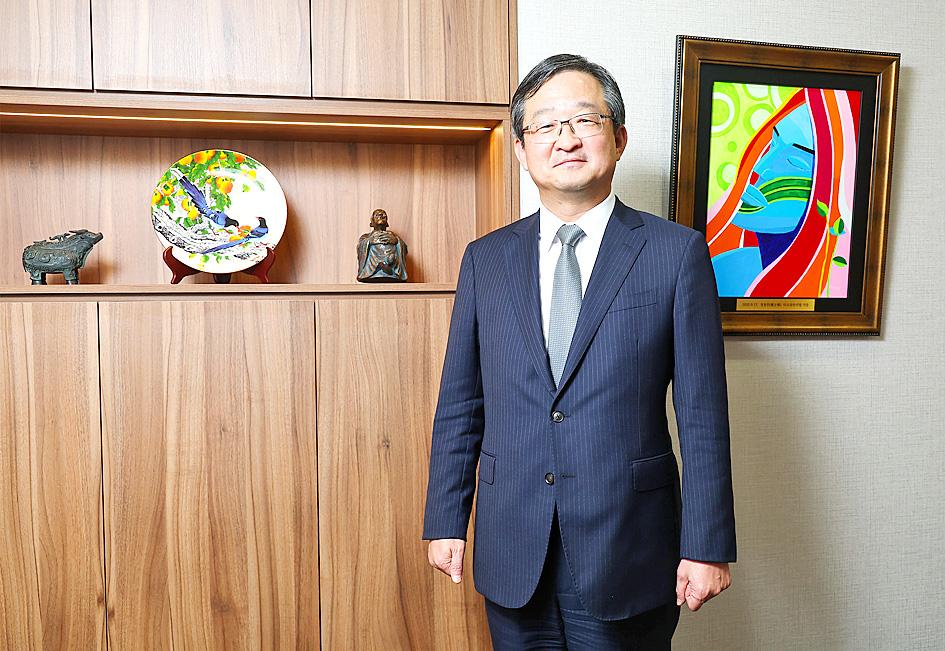South Korean Representative to Taiwan Chung Byung-won said he has been taking a more systematic approach to the exchanges between the two sides since taking up his post in December last year.
Chung made the remarks during an interview with the Central News Agency.
The two countries have always had close economic, trade and tourism ties, he said, adding that bilateral exchanges are expected to increase following the inauguration of new South Korean President Yoon Suk-yeol.

Photo: CNA
Taiwan and South Korea are each other’s fifth-largest trading partners, with bilateral trade reaching US$50.76 billion last year for annual growth of 41.98 percent, he said, citing government data.
The travel volume between the two countries was 2.5 million people before the COVID-19 pandemic in 2019, with each side being the other’s third-largest source of international tourists, Chung said.
South Korea and Taiwan are global leaders in the semiconductor industry, the former known for its high-quality memory chips, and the latter for its OEM and ODM products, he said.
South Korea and Taiwan are not only competitors in the global semiconductor industry, but are also close partners with complementary strengths, Chung said.
For instance, semiconductor-related products account for 44 percent of South Korea’s exports to Taiwan and 67 percent of Taiwan’s exports to South Korea, he said, citing data from last year.
Against this backdrop, Chung said that one of his priorities is to create a more systematic approach to supporting the ties between the two sides.
To that end, Seoul and Taipei signed a reciprocal driver’s license agreement in February, with immediate effect, to make driving easier for visitors on each side, he said.
Following the signing of a double taxation agreement in November last year, the two sides are now in talks on a potential financial cooperation pact, he said.
Those efforts are aimed at building systematic and structural support for closer bilateral exchanges on all fronts, he added.
With the expected easing of border controls in the second half of this year, Chung said he is hoping that travel between the two nations will return to pre-pandemic levels.
Chung said his office is also planning to hold a fashion show in Taipei in November, which would highlight traditional Korean clothing known as hanbok.
Next year, on the 30th anniversary of the Korean Mission in Taipei, a cultural week would be organized to celebrate the milestone, he said.
The 58-year-old said he has come to love the mountains of Taiwan, adding that he is planning a four-day climb next month to Yushan (玉山), Taiwan’s highest peak.

Taiwanese scientists have engineered plants that can capture about 50 percent more carbon dioxide and produce more than twice as many seeds as unmodified plants, a breakthrough they hope could one day help mitigate global warming and grow more food staples such as rice. If applied to major food crops, the new system could cut carbon emissions and raise yields “without additional equipment or labor costs,” Academia Sinica researcher and lead author the study Lu Kuan-jen (呂冠箴) said. Academia Sinica president James Liao (廖俊智) said that as humans emit 9.6 billion tonnes of carbon dioxide compared with the 220 billion tonnes absorbed

The Taipei Mass Rapid Transit (MRT) Wanda-Zhonghe Line is 81.7 percent complete, with public opening targeted for the end of 2027, New Taipei City Mayor Hou You-yi (侯友宜) said today. Surrounding roads are to be open to the public by the end of next year, Hou said during an inspection of construction progress. The 9.5km line, featuring nine underground stations and one depot, is expected to connect Chiang Kai-shek Memorial Hall Station to Chukuang Station in New Taipei City’s Jhonghe District (中和). All 18 tunnels for the line are complete, while the main structures of the stations and depot are mostly finished, he

Taipei is to implement widespread road closures around Taipei 101 on Friday to make way for large crowds during the Double Ten National Day celebration, the Taipei Department of Transportation said. A four-minute fireworks display is to be launched from the skyscraper, along with a performance by 500 drones flying in formation above the nearby Nanshan A21 site, starting at 10pm. Vehicle restrictions would occur in phases, they said. From 5pm to 9pm, inner lanes of Songshou Road between Taipei City Hall and Taipei 101 are to be closed, with only the outer lanes remaining open. Between 9pm and 9:40pm, the section is

China’s plan to deploy a new hypersonic ballistic missile at a Chinese People’s Liberation Army Rocket Force (PLARF) base near Taiwan likely targets US airbases and ships in the western Pacific, but it would also present new threats to Taiwan, defense experts said. The New York Times — citing a US Department of Defense report from last year on China’s military power — on Monday reported in an article titled “The missiles threatening Taiwan” that China has stockpiled 3,500 missiles, 1.5 times more than four years earlier. Although it is unclear how many of those missiles were targeting Taiwan, the newspaper reported